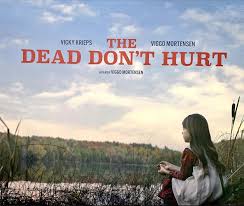The Dead Don’t Hurt 2024 Movie Review
The name of actor, producer and director Viggo Mortensen can easily convince most people to see almost anything it may be attached to. Looking back at his extensive filmography spanning almost 40 years, it’s safe to say: for good reason. At first glance, The Dead Don’t Hurt may seem rather innocuous — a western set at the dawn of the American Civil War — but give it ten minutes, and it will quench the thirst of any cinephile yearning to see a sheriff Viggo, as teased by Lisandro Alonso’s Eureka . Mortensen’s Toronto-launched western is his second feature film as a director after 2020’s Falling and was presented to Luxembourg City Film Festival audiences as this year’s closing title and as part of a tribute to the artist.
The Dead Don’t Hurt opens with a sequence that is both a prologue and an ending: a knight in full armour rides through a verdant forest, the iron glistening as much as the sunshine peeking through the tree crowns. In a blink all of that is gone; it was only a dream, or a childhood memory (aren’t they one and the same?). Then, we see a woman (Vicky Krieps) on her deathbed, taking her very last breath. A slow zoom out reveals a man (Mortensen) sitting on the bed; silently, he closes her eyes forever. Their shared silence lingers, from this opening to the film’s very end, piercing the western tropes and (historically faithful) period settings with Cupid’s spiky arrows: love is possible only when the world is changing.
Vivienne Le Coudy (Krieps) is the story’s true protagonist. A woman-led western this is not — not the way one might expect, although she does, notably, wield a gun — but The Dead Don’t Hurt is a film about a woman in a western. Vivienne is French-Canadian, but lives in San Francisco; she sells flowers at the market and occasionally dines with fine yet utterly boring gentlemen. Most importantly of all, she refuses to marry. Her mind is not swayed even by a charming carpenter, however much she likes him. Holger Olsen (Mortensen) is a war veteran, a Danish immigrant who now calls America his home and emanates a sense of dignity and humbling affection every time he meets Vivienne’s gaze. However, the promise of a quaint life together in Elk Flats, Nevada, in a small house with a lot of space for trees to grow and for gardens to flourish, is soon broken.
Everyone in town bows to the Jeffries clan, a rich proprietor and his son, Weston (played by a merciless Solly McLeod, a fresh face you may recognise from House of the Dragon), who doesn’t take no for an answer. Under the mayor’s protection — it only takes seconds for Danny Huston to stand out in a morally corrupt role — the Jeffries become untouchable, and Vivienne exceptionally vulnerable when Holger decides to fight for the Union in the Civil War. Love is challenged, love is postponed: the audience gets to spend long days and nights with Vivienne as she serves beer at the saloon and tends to her roses. In these quiet scenes, Krieps softens, her character attune to every beat and mood of the others around her, though she never lets any of that get to her. She is unflinching, at times almost stiff, but always true to the values of a self-reliant woman in a male-dominated environment. Both Krieps and Mortensen bring the very best out of each other and every scene they share bristles with emotion, making The Dead Don’t Hurt perhaps the most romantic (and realistic) western of our times.




